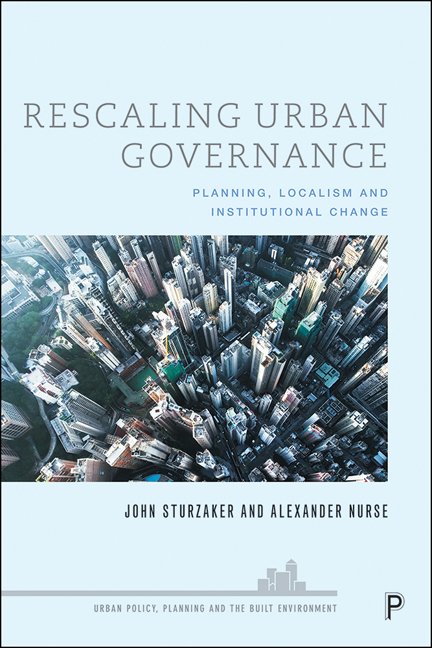Book contents
- Frontmatter
- Dedication
- Contents
- List of Tables, Figures and Boxes
- Notes on Authors
- Glossary
- Acknowledgements
- 1 Introduction: Planning Reform and State Spatial Rescaling
- 2 Devolution: A Patchwork Quilt of Planning Reform
- 3 Replacing the Regions: The evolution of English Subnational Reform
- 4 City Regions and the Cities Within Them: Connecting two Overlapping Scales
- 5 Local Authorities: Powerhouses or Scapegoats?
- 6 Community-led Governance: Opportunities and Constraints
- 7 Conclusion: Rescaling Urban Governance
- References
- Index
7 - Conclusion: Rescaling Urban Governance
Published online by Cambridge University Press: 03 March 2021
- Frontmatter
- Dedication
- Contents
- List of Tables, Figures and Boxes
- Notes on Authors
- Glossary
- Acknowledgements
- 1 Introduction: Planning Reform and State Spatial Rescaling
- 2 Devolution: A Patchwork Quilt of Planning Reform
- 3 Replacing the Regions: The evolution of English Subnational Reform
- 4 City Regions and the Cities Within Them: Connecting two Overlapping Scales
- 5 Local Authorities: Powerhouses or Scapegoats?
- 6 Community-led Governance: Opportunities and Constraints
- 7 Conclusion: Rescaling Urban Governance
- References
- Index
Summary
The overall aim of this book has been to analyse the cumulative effects of recent reforms (2010–onwards) to city governance in the United Kingdom, explicitly considering whether they can be said to be progressive in nature. We had three objectives: first, to present in one easily accessible volume comprehensive yet concise analysis of results of the changes to city governance that have been seen in the UK since 2010, at a range of scales. Second, to consolidate and disseminate research in this field and new thinking about the overall implications of this research, to facilitate informed discussion and debate about changes to governance practices and the outcomes of those changes. Finally, to challenge policy and practice in the field of city governance in the UK and internationally, strengthening the evidence base for policy-makers to take decisions regarding reforms to governance practices.
This chapter summarises the preceding chapters, bringing together a discussion around a number of key themes, including reflections on the power relationships inherent within governance approaches (that is, ‘who wins?’); the success or otherwise of attempts to deal with contemporary issues such as housing, transport and jobs provision; the possible implications of Brexit and other ‘external’ changes; and alternative forms and modes of localism. It also synthesises international reflections, both in terms of how the UK might learn from elsewhere in how it moves forward, and what other places might learn from the UK.
Planning, localism and institutional change
Planning reform and state spatial rescaling
The opening chapter of this book used a number of key topics to set the context for the subsequent discussion. The first of these was the ‘grand challenges’ facing cities around the world, including in the UK. Perhaps the most significant of these is globalisation, which has had profound consequences for much of the world. Many of these consequences can be conceived positively, but there is little doubt that the structural changes to economies in ‘Western’ countries such as the UK and USA had, and continue to have, major negative ramifications for many cities. The 2008 global financial crisis highlighted many of these problems.
- Type
- Chapter
- Information
- Rescaling Urban GovernancePlanning, Localism and Institutional Change, pp. 147 - 162Publisher: Bristol University PressPrint publication year: 2020



